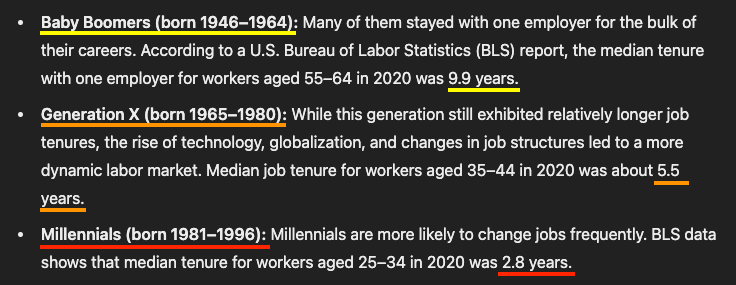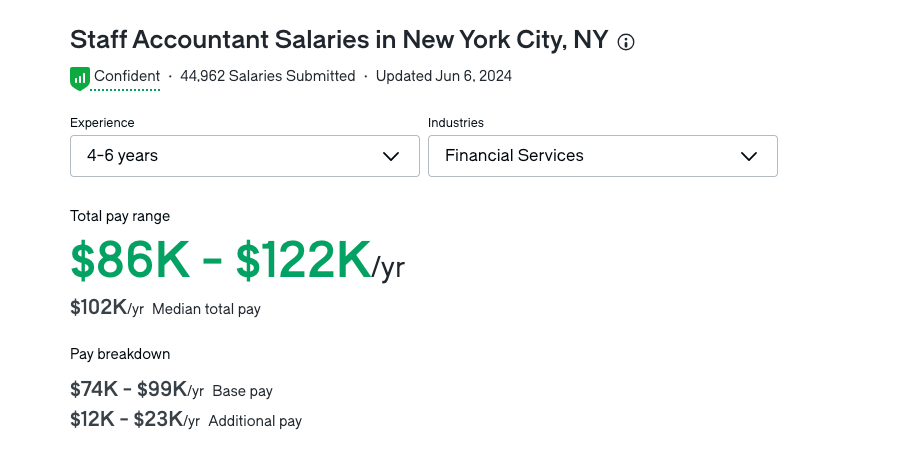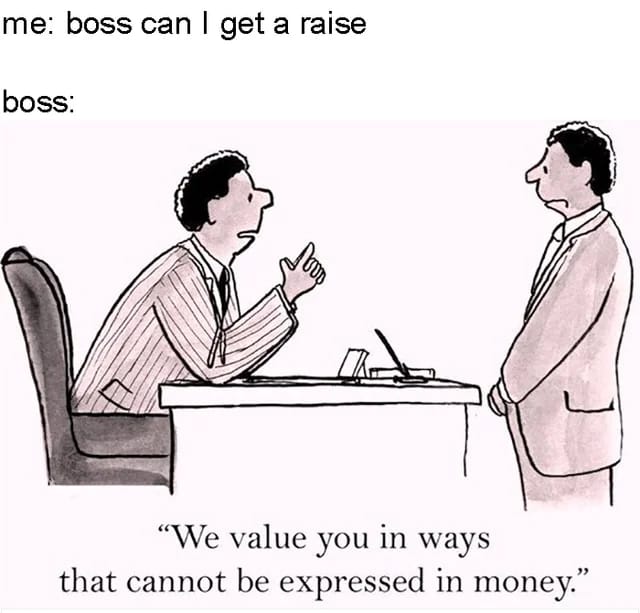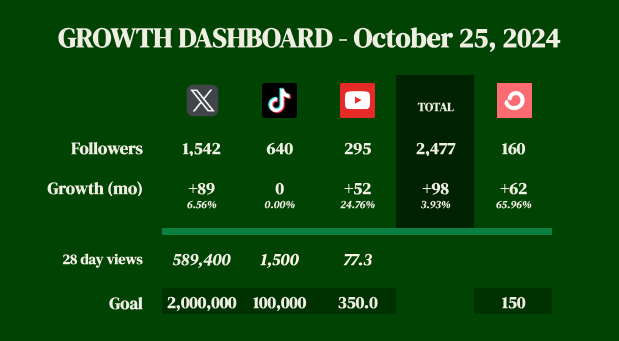I received wonderful feedback on my recent career advice series. If you missed it, here is How to Apply for Jobs and How to Ace the Job Interview.
Today, we’re talking about your salary.
Because for the vast majority of people who work a 9-to-5 job, your salary is your main source of income. And so it’s especially important to ensure that you are being paid what you’re worth.
In this issue:
Why Asking for a Raise is Important
Step 1: Doing Your Research
Step 2: Preparing Your Business Case
Step 3: Presenting Your Business Case
Step 4: Following Up and Documentation
Let’s dive in.
Why Asking For a Raise is Important
Perhaps you don’t need to be convinced, and you can skip this section.
But there’s a really important phenomenon in our modern economy which makes asking for a raise especially important.
To put it simply:
Your employer typically provides annual salary increases of 3-5%
Your employer does this so that your salary outpaces inflation, which historically is ~2%
Therefore, your salary is increasing in value faster than inflation is destroying it
But, there’s a problem…

Inflation just hit 9%, the highest in decades.
Did you get a 10% raise last year?
If you did, that is awesome! You have an employer that not only recognizes your value, but understands that inflation is eating away at your salary at an accelerating pace.
To put it even more bluntly:
If you received less than a 9% raise in 2022, your salary actually lost value.
That’s because even if your salary went up by up to 8% in nominal terms, it decreased in real terms.
If that statement is puzzling to you, I recommend reading my previous article on real vs. nominal wages.
If you’re in this boat, don’t worry. You’re not alone:

Average tenures at companies have been decreasing drastically for decades.
There are many reasons for this, but one of the reasons is because it is becoming more profitable for employees to leave their company and negotiate a salary at a new firm.
So before you jump ship and find a new employer, you might as well as for that raise.
How do you do it? Here’s what I recommend:
Step 1: Do Your Research
You’ll want to research a few things:
What is your market rate?
How financially stable is your company?
Is there a time of year that your company does salary adjustments?
Your market rate is essentially what people at other companies are being paid in a similar role with a similar level of experience.
You want to make sure that you’re being paid on par with your peers at other firms.

LinkedIn and Glassdoor are great free resources to find out your market rate.
You can also find professional associations or online communities for your profession that conduct salary surveys or other anecdotal data points.
Worst case, you can ask a friend. The bottom line is this:
Know your market rate to make sure you’re not being underpaid.
Next, you want to figure out if your company has been doing well financially. If your employer is a publicly-traded company, this can be as simple as looking at the company’s stock performance.

If you work at Nvidia, you'd better ask for a raise (in the form of equity!)
If your company is smaller and/or privately held, then you need to do a bit more work.
Has the company been hitting it’s sales targets?
Is the company hiring a lot of people, letting people go, or neither?
Have there been significant changes to the leadership team?
These are all potential signs that your company is doing well, or not doing so well.
A company that is doing well financially is much more likely to grant salary increases.
Last but not least, you want to find out when your company typically does salary adjustments.
e.g. If your company does salary reviews in August, you’ll want to start Step 3 around June or July.
But Step 2, you’ll want to start ASAP.
Step 2: Prepare Your Business Case
I’ve mentioned before that I come from the sales world.
When selling to a large enterprise client, we often used business cases.
Put simply, a business case is a document and presentation that outlines why making a particular decision is good for the business.
In the context of asking for a raise, the decision is granting you a raise.
You want to demonstrate to your employer that granting you a raise is a good decision for the business.
The first step is to collect your evidence.
Collect evidence of the work that you’ve done throughout the year.
Ideally, this evidence is quantifiable in nature i.e. you are able to demonstrate in numerical terms how much time or money you saved the company, or how much money you made for the company.
If your role is hard to quantify, that’s fine. Use qualitative evidence.
Did you contribute or lead a major project?
Did you complete any tasks or projects on time, or sooner than expected?
Did you receive praise from clients, other teams, or company leadership?
Everything counts.

If you helped the company do well, they should help you do well.
Now, you might be thinking this is a waste of time.
“I already did all this work… why do I have to document it and put it together in a business case for my boss? Shouldn’t they know all this already?”
Unfortunately, the people that are best at their jobs aren’t always the people that are paid the most.
It’s usually the people who are best able to demonstrate their value to their employer.
Yes, you need to do a good job… but that’s not enough.
Now that you’ve collected your evidence, you can get ready for Step 3.
Step 3: Present Your Business Case
Now that you have evidence of your work in a document or slide show presentation, you’ll want to find time with your boss to walk them through it.
This will depend heavily on your role, your relationship with your boss, how frequently you meet, and so on.
But a couple universal things I’d recommend here:
Begin this process well in advance of the salary adjustment season. At least 1 month, maybe 2 months to be safe
Give your boss a heads up that the purpose of the meeting is to discuss your salary. Don’t surprise them in the meeting. However,
Take control of the meeting. Don’t let your boss start the meeting with a preemptive “no”. Let them know you have prepared a presentation.
Once you’ve presented your business case, make your ask!
When you make your ask, ask for a specific $ or % raise. Be specific.

Asking for a raise with a business case accomplishes several things:
Firstly, it provides an argument for why you deserve a raise in a language that the business understands.
Secondly, it shows that you are serious. The fact that you put in the effort to prepare and present a business case shows that you take your job (and your salary) seriously.
And perhaps most importantly, it highlights to your employer the cost of inaction.
Because if they don’t give you a raise, you very well may leave and find a new job.
Which takes us to Step 4.
Step 4: Follow Up and Document Everything
Your conversation can go a few ways.
Best case scenario: your boss grants you the $ or % raise you asked for.
This is unlikely, but could happen. If this happens, you need to ask your boss for confirmation in writing.
Then, after the meeting, send an email to your boss confirming the raise that they agreed to, and ask them to reply for confirmation as well.
As mentioned, an immediate “yes” is unlikely.
Here are a couple other scenarios that could happen:
They say “Let me check with HR / Finance.”
If they say this, again, you want to document everything and get clear on the next steps in the process.
When will they be checking with HR / Finance?
Does HR / Finance need your business case document?
When can you expect to hear back from your boss?
Once again, get this all in writing.
They say “We don’t have budget this year, but we’ll consider it for next year.”
If they say this, then you need to ask a very important question:
“What do I need to accomplish in the next year to ensure I get a raise next year?”
Ask your boss for specific, tangible things that you can accomplish this year. Force them to spell it out for you, so that next year, your business case is bulletproof.
In other words, you are strengthening your business case for next year.
And if next year rolls around, you’ve completed the items on that list, and you still don’t get a raise…
You should be out the door.
Because you’ll be much more likely to achieve that salary increase elsewhere.

My personal take: never accept counter-offers.
It’s important to note that this might not be your boss’ fault. Oftentimes, managers are at the whim of the budget that the Finance team provides them.
And the budget is ultimately dictated by the financial performance of the company.
Which goes back to Step 1 - this is why it’s so critical to understand if your company has been doing well, or not.
So to recap:
You research your market rate, your company’s financial performance, and your company’s salary increase cycle.
You prepare your business case with as much quantitative and qualitative evidence of your work.
You present you business case to your boss 1-2 months in advance of salary increase season.
You follow up and document anything agreed upon in the meeting.
If they say NO, you ask for specific steps for you to accomplish in the next 12 months to get a raise next year.
If they say NO in Year 2, you leave and find a new job.
Hopefully this has been helpful to you. And if you have any more career-related questions, feel free to let me know and I’d be happy to write a future article on the topic.
Build in Public Update

One of the fascinating things about being a Creator / solopreneur is that with every work session, I come up with more ideas than I can execute on.
My to-do list grows faster than I can complete it.
I recently had my onboarding call with the Beehiiv VIP Migration team and they were extremely helpful in getting me set up.
But they also provided about a dozen things I could be doing to grow my newsletter faster:
Set up a referral program
Configure Beehiiv Boosts (paid newsletter recommendations)
Set up a Welcome email
Create a lead magnet PDF or guide
Create a paid subscription tier
I’ll be experimenting with some of these in the coming weeks. I don’t think I’ll be creating a paid tier anytime soon, but it’s definitely something I’m considering for the future.
Do you subscribe to any paid newsletters?
My main focus remains my YouTube and my newsletter, but I also want to experiment with scaling my other social media channels (X, TikTok, Instagram) in a low-effort way.
Being a Content Creator is a lot of things… but dull is not one of them.
To your prosperity,
Brandon @ Wealth Potion
